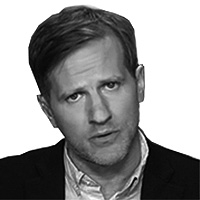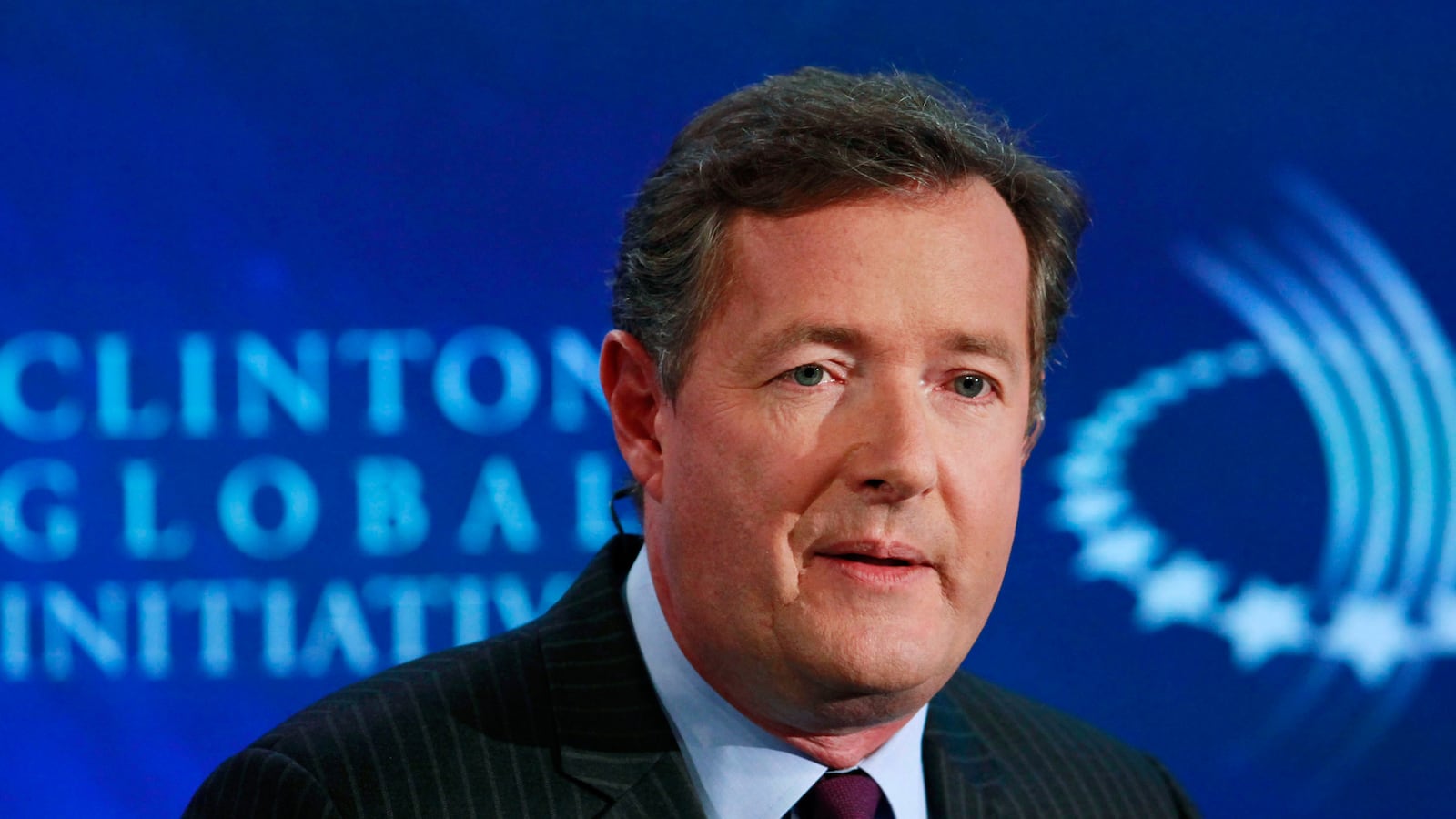When he’s not solving America’s gun problem, CNN host Piers Morgan spends an extraordinary amount of time battling his critics (there are many) and defending his journalistic integrity. In the course of doing the former, he frequently damages the latter. Because random Twitter trolls, long-time adversaries, and politically disagreeable guests on Piers Morgan Tonight are dismissed as hacks, morons, and scumbags. When I recently criticized him for trivializing the gun-control debate by arguing with unserious people on a very serious topic, Morgan responded with the grace and dignity befitting a CNN journalist: he called me a “poisonous little twerp” on Twitter.
In an interview with Politico media reporter Dylan Byers, Morgan, unconstrained by a 140-character limit, fires back at his critics in much the same fashion, offering a full-throated defense of his interview with conspiracy theorist Alex Jones (“The best thing about Alex Jones is that 8 million people watched that video on YouTube”), shrugging off the complaints of his predecessor at CNN, Larry King (“I’m a journalist and he’s not”), and claiming that his anti-gun crusade has reached the highest corridors of power (“The president of the United States espoused exactly what I’ve been saying for the last five weeks. No one can tell me we haven’t had an influence”).
When arguing in favor of his seriousness and political impact, Morgan dismissed one of his highest-profile critics with a wave of the hand and a pair of profanities. Asked by Byers to address attacks leveled by Daily Beast blogger Andrew Sullivan—who headlined a recent blog post “The Dumb, Disgusting Desperation of Piers Morgan”—he declared his fellow Brit to be “a dick” who is “extremely bitchy.”
It’s a description that Morgan—a deeply serious journalist, remember—frequently uses to describe Sullivan. Despite professing that he doesn’t “give a toss” about his adversary, Morgan’s Twitter feed is laced with attacks on the “bitchy @sullydish” and his “bitchy piece[s]” about Piers Morgan Tonight; complaints that “bitchy @sullydish forgot to mention” certain relevant, pro-Piers information; and general irritation at his “bitchy whines” and “whiny hissy-fit blogs.” When Sullivan snarked about CNN’s low ratings, Morgan advised his antagonist to watch his “bitchy cyberspace back, sunshine.” Indeed, he appears incapable of uttering Sullivan’s name without the word “bitch” making a cameo. (Irish talk host Graham Norton, who is also gay, has a similarly reserved verb: Morgan has no time for the “mincing, talentless little fool” or, alternately, the “mincing little midget.”)
Such schoolyard taunts might not inflict much damage on his reputation (he is, after all, an opinion journalist), but his past controversies—the phone-hacking accusations, share-tipping scandal, fake Iraq War abuse photo scandals—that have made him a punchline in the United Kingdom have caught up with him in the United States. He tells Byers that he “refused to apologize or accept that [The Daily Mirror] had necessarily been duped” by photos purporting to show British soldiers abusing Iraqi prisoners. When the pictures were exposed as fakes, Morgan was quickly fired as the tabloid’s editor.
“I still don’t accept [that they were phony]—I’ve never seen the evidence,” he tells Politico. But with so many obvious anomalies, the journalistic burden of proof is on Morgan to prove that the photos weren’t faked. He is more lawyerly than journalistic in his defense, saying that he “refuses to accept that they were necessarily fakes” and that the newspaper hadn’t “necessarily been duped.” If it can be proven that the pictures were “100 percent fake, I will apologize.” How they could be, say, 90 percent fake is unclear, though he naturally claims that the hoax nevertheless “exposed a wider truth.” In other words, the story might have been fake, but it was ultimately accurate. (It should be noted that his own network believes the abuse photos were part of a “hoax”).
According to Politico, Morgan feels set upon, annoyed that his critics focus only on his interviews with conspiracy theorists like Jones and former professional wrestler Jesse Ventura. “Why don’t people watch my interviews with Justice Scalia, President Clinton, President Carter, the Dalai Lama, Michael Bloomberg, any of the Republican candidates for the nominee race, Mahmoud Ahmadinejad.” It’s a question that CNN’s top brass would also like answered—his ratings have ticked up recently, though are still well short of his competitors at MSNBC and FOX—but it also rather misses the point. The act of interviewing clever and important people doesn’t, on its own, confer respectability. If The View were to spend 20 minutes discussing literature with Philip Roth, the only lesson to be drawn is that ABC hired a terrific booker—and that Roth was perhaps getting desperate in retirement.
Indeed, Morgan’s interview with Iranian theocrat Mahmoud Ahmadinejad, whom he respectfully called “a scholar” and “a very intelligent man,” is instructive. Morgan was occasionally tough on Ahmadinejad, but managed only uninteresting questions and, as a result, received predictably evasive answers (“So to clarify, Mr. President, if a single woman from Iran is watching this interview, she can go skiing on her own?”). And while guests that take an opposing position on the gun debate are mau-maued, scorned, insulted, and prevented from giving answers, Ahmadinejad’s rebuke of Morgan’s frequent interruptions resulted in a chastened apology: “Forgive me for my impertinence. I will allow you to answer in any way you see fit.”
In fairness to Morgan, though, the former tabloid hack recently acknowledged that there exists a line beneath which journalists should not trespass. “These ridiculous, vile Sandy Hook ‘truthers’ don’t deserve a moment of airtime or publicity,” he tweeted recently. “Just ignore them.”
It’s sage advice. But had he read this “poisonous little twerp’s” exposition of the Sandy Hook conspiracy theorists, Morgan might have learned that one of their leading proponents is none other than Alex Jones.
But then again, the interview did get 8 million views on YouTube.





